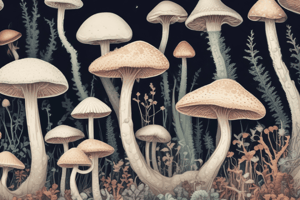Podcast
Questions and Answers
Which of the following fungi can grow as a yeast at body temperature and as a mold at room temperature?
Which of the following fungi can grow as a yeast at body temperature and as a mold at room temperature?
- Histoplasma capsulatum (correct)
- Candida albicans
- Trichophyton rubrum
- Rhizopus oryzae
What is the primary route of transmission for infections caused by Cryptococcus neoformans?
What is the primary route of transmission for infections caused by Cryptococcus neoformans?
- Sexual contact
- Inhalation (correct)
- Skin contact
- Ingestion
Which fungal species is primarily associated with infections in immunocompromised patients?
Which fungal species is primarily associated with infections in immunocompromised patients?
- Cryptococcus neoformans
- Sporothrix schenckii
- Blastomyces dermatitidis
- Aspergillus fumigatus (correct)
Which of the following fungi is known to produce aflatoxins?
Which of the following fungi is known to produce aflatoxins?
Which method is commonly used in the laboratory to differentiate between yeasts and molds?
Which method is commonly used in the laboratory to differentiate between yeasts and molds?
Which fungal infection is commonly referred to as 'rose gardener's disease'?
Which fungal infection is commonly referred to as 'rose gardener's disease'?
Which fungal species is a common cause of oral thrush?
Which fungal species is a common cause of oral thrush?
What is the major distinguishing feature between yeasts and molds?
What is the major distinguishing feature between yeasts and molds?
Which of these fungi is dimorphic and can exist as both mold and yeast?
Which of these fungi is dimorphic and can exist as both mold and yeast?
Which structure allows mold to spread and grow rapidly?
Which structure allows mold to spread and grow rapidly?
Which stain is used for detecting fungal infections in tissue biopsies?
Which stain is used for detecting fungal infections in tissue biopsies?
What is the primary mode of transmission for Histoplasma capsulatum?
What is the primary mode of transmission for Histoplasma capsulatum?
What is the most common form of reproduction in molds?
What is the most common form of reproduction in molds?
Which type of fungal infection does Sporothrix schenckii primarily cause?
Which type of fungal infection does Sporothrix schenckii primarily cause?
What role does ergosterol play in the fungal cell membrane?
What role does ergosterol play in the fungal cell membrane?
Which reagent is commonly used in the germ tube test for Candida albicans?
Which reagent is commonly used in the germ tube test for Candida albicans?
Study Notes
Dimorphic Fungi
- Histoplasma capsulatum is a dimorphic fungus, which means it can exist in two forms: a mold form in the environment and a yeast form in the body.
Distinguishing Yeasts and Molds
- The most significant difference between yeasts and molds is their hyphal structure.
- Yeasts are unicellular, while molds are multicellular organisms with branched filaments called hyphae.
Common Fungal Infections
- Trichophyton rubrum is a common cause of athlete's foot.
Fungal Toxins
- Penicillium marneffei is a fungal species known for producing aflatoxins, a type of mycotoxin.
Opportunistic Fungi
- Aspergillus fumigatus is a type of fungus that commonly causes infections in immunocompromised individuals.
Laboratory Identification of Fungi
- KOH mount is a commonly used method to differentiate between yeasts and molds in laboratory settings.
Oral Thrush
- Candida albicans is a common cause of oral thrush.
Fungal Diseases
- Sporotrichosis, also known as "rose gardener's disease", is a fungal infection caused by Sporothrix schenckii.
- Cryptococcosis is a fungal infection caused by Cryptococcus neoformans, typically characterized by cryptococcal meningitis.
- Blastomycosis is a fungal infection caused by Blastomyces dermatitidis.
- Coccidioidomycosis is a fungal infection caused by Coccidioides immitis and Coccidioides posadasii.
Fungal Transmission
- The primary mode of transmission for Cryptococcus neoformans infections is inhalation.
- The primary mode of transmission for Histoplasma capsulatum infections is inhalation.
Temperature-Dependent Fungal Growth
- Histoplasma capsulatum can grow as a yeast at body temperature (37°C) and as a mold at room temperature (25°C).
Systemic Fungal Infections
- Aspergillus is a fungal genus commonly responsible for systemic infections in immunocompromised individuals.
Fungal Reproduction
- Spore formation is the primary mode of reproduction in molds.
Fungal Staining
- Calcofluor white is a fluorescent stain used to detect fungal cell walls in tissue samples.
Fungal Cell Membranes
- Ergosterol maintains the integrity of fungal cell membranes.
Fungal Culture
- Sabouraud Dextrose Agar (SDA) is a media commonly used for fungal cultures. Its optimal pH is 5.6.
Fungal Testing
- The germ tube test is a rapid diagnostic test that differentiates Candida albicans from other Candida species.
- The KOH mount is used to visualize fungal elements in clinical samples.
- Calcofluor white is a dye used to detect fungal cell walls in tissue samples.
Fungal Preservation
- Glycerol is a preferred solution for preserving fungal samples.
Fungal Growth
- The ideal temperature for fungal culture incubation is 25°C.
Studying That Suits You
Use AI to generate personalized quizzes and flashcards to suit your learning preferences.
Description
Test your knowledge on dimorphic fungi, their classifications, and the common infections they cause. This quiz covers key differences between yeasts and molds, as well as laboratory identification methods. Explore the fascinating world of fungi and their impact on health.




